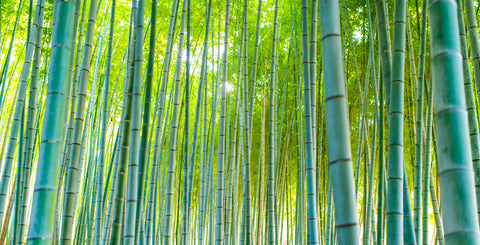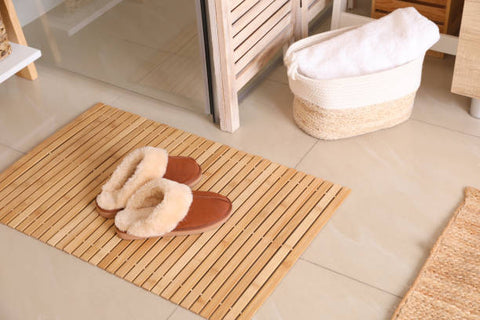
Is a bamboo bath or shower mat a good idea?
Bamboo bath mats

Do Bamboo Bath mats absorb water?
This question pops up time and time again. One of the primary functions of a bath mat is to stop the bathroom floors from being wet and hazardous. While Bamboo is naturally water resistant, excessive water will cause it to warp and discolour over time, so ideally if it becomes very wet it needs to be dried quickly. The majority of water landing on a bamboo bath mat will be repelled or pool on the surface of the mat. Some bamboo bath mats are elevated and have slats, so the water will pool underneath (the safest option), flat mats will part the water to the side.
Do Bamboo bath mats get mouldy?
Despite being touted as anti-mildew you cannot leave a bamboo bath mat damp and they need cleaning regularly. Bamboo is most likely to become moldy in humid conditions and between 25 and 35 degrees C, so bathrooms that are hot and not well ventilated may not be the ideal place for bamboo bath and shower mats. Here is a great article about the types of mould and bacteria that can form and what causes it. Bamboo is a plant after all so moulds can form on them if not treated correctly, although less so than many other hardwoods.
How do you clean Bamboo bath mats?
Bamboo is generally low maintenance, for optimal care dust it weekly with a cloth or brush then wipe with a mild cleanser and damp cloth. Try not to oversaturate as this can cause it to swell and leave out to air/sun dry. Bamboo can become very brittle if left near to radiators or on heated floors so it is advised to occasionally polish it with linseed oil to prevent cracking. Grime can build up over time on bamboo bath mats so every 3-6 months use a soft bristle brush to clean up, then towel dry and use the linseed oil again. For soft bamboo bath mats you will need to consult the washing instructions on the product.
Can Bamboo shower mats be recycled?
We know Bamboo is a sustainable material but is it recyclable? This is a tricky question as most Bamboo bath mats are likely to be treated with chemicals in some way to protect them from marking and maintaining their look, this can make them difficult to recycle. Only natural bamboo is truly recyclable. If you care for your bamboo bath mat well, it’s not the kind of item that will need changing often so when the time comes the best thing could be to repair or re-use the material rather than sending it to the lottery that is UK recycling. Soft bamboo shower mats are likely to be backed with another material making recycling extremely unlikely due to issues of seperation
Are bamboo bath mats naturally antimicrobial?
This all depends on how the material has been processed, in its natural state bamboo is anti-bacterial plant but this can change by the time the product reaches you. We suggest you follow the regular cleaning instructions in this article to avoid mildew and bacteria forming. Slated bamboo bath mats can be difficult to get into the crevices where damp conditions can favour bacteria growth. Soft bamboo bath mats may offer slightly greater anti-mildew resistance than cotton but we have no particular evidence of this in commercially produced products.
Are Bamboo bath mats slippy?
Yes, if water gets underneath them, which it will they can become slippy. The degree of the hazard will depend on how smooth the surface they are placed on and whether they mat has been fitted with additional rubber anti-slip, feet. Soft bamboo shower and bath mats are more likely to be slippy than hard mats, although, again it depends on the backing.
Can I use bamboo shower mats inside the shower?
Again, if the mat is fitted with a non-slip rubber or similar material underneath, it is possible. Without this addition, the bamboo will be too slippy to use, of course the topside could still be hazardous, so we wouldn’t generally advice it. The bamboo will need immediately drying too, so it all sounds like more hassle than its worth!
Verdict on Bamboo bath and shower mats
If you are considering a bamboo bath mat, you have probably heard about the environmental benefits of bamboo and are the type of person that likes to do their bit. We applaud you!
The problem is, bamboo bath mats don’t have the softness of cotton or microfibre, are not as slip-free as rubber and don’t absorb water like memory foam. Despite the marketing messages, they will also get mouldy and mark if not cared for. The main advantage is that Bamboo and wooden bath mats save the need for machine washing and drying which is good for the environment and the material itself is sustainable.
A great alternative to a bamboo bath mat
It maybe you just want the wood look which is fine, but if you want a practical, environmentally friendly, low maintenance bath mat why not consider a natural earth stone mat. Natural Earth Stone bath mats are made of naturally occurring rock sediment that can easily be returned to earth at the end of their lives. They are:
- Super absorbent
- Quick drying
- Genuinely anti-mildew
- Don’t need washing
- Stylish and contemporary
To find out which material best meets your requirements in a bath mat please check out this article on best type of material to use for a bath math

Comments (0)
There are no comments for this article. Be the first one to leave a message!